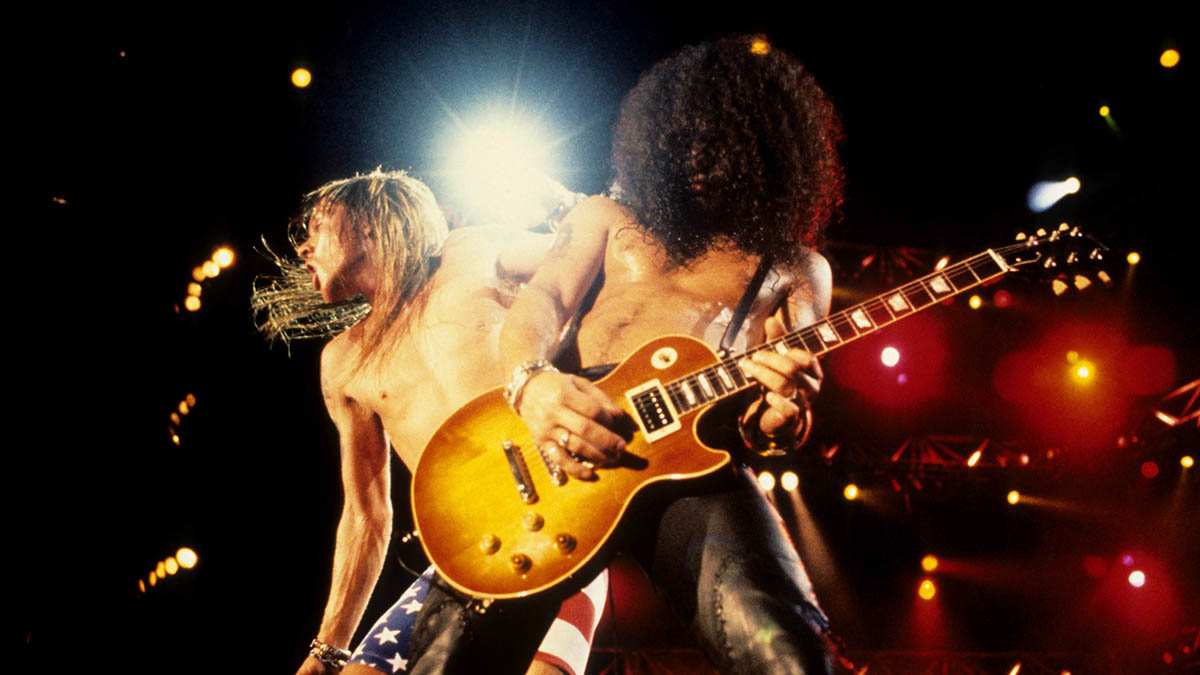Ex-GNR manager Alan Niven explains why Slash is a guitar god: “Great players revere the space between their notes”
Niven had a ringside seat for the ascent of Slash and GNR, and recalls a player who was solely focused on creating a musical identity, but maybe someone you would not lend a Gibson SG to...

For a while, Alan Niven had the most difficult job on the planet. The New Zealand music industry veteran was Guns N’ Roses’ manager at a time when the brilliant but fractious, self-destructive and just plain old destructive band’s talents were cresting.
After a cold start, their 1987 debut album, Appetite For Destruction, would soon become a hard rock legend, and a rod for their own backs – Niven’s included – when it came time to release a follow-up, with David Geffen breathing down their necks.
But as Guns manager, Niven was afforded a unique perspective on the band’s totemic lead guitarist, Slash, whom he watched mature before his own eyes, and in a recent interview with Louder, Niven explained Slash’s approach to the guitar as he saw it, and what made him stand out to his peers.
- Slash shares his 7 tips for recording live
- Dave Navarro recalls ‘very strange’ Guns N’ Roses studio session
At first, says Niven, there was “ lots of energy and even more notes”, a coltish player looking for his voice. Slash, however, soon found out what he wanted from the electric guitar – he soon found a sound.
“I first thought he might be beyond average when I asked him what he wanted from the band, from his playing – ‘I want to be recognisable,’ he said. He wasn’t referring to a top hat , he was talking about developing a personal style that could be recognised,” said Niven. “Think of Santana. Think of Robin Trower. Think of Peter Green. All have their feel and sound. Predominantly determined by their left hands.”
Niven described Slash in the early days of Guns N’ Roses as “inebriated” and “excited” but not lacking in focus when it came to creating.
“Slash didn’t say he wanted a house, an endless stream of girls, an Aston Martin,” said Niven. ‘He wanted to develop his technique so that it would have an identifiable character. That’s an intelligent and special musician.”
Want all the hottest music and gear news, reviews, deals, features and more, direct to your inbox? Sign up here.
That process meant finding some space in his sound, something that differentiated Slash from the other six-string hot-shots on Sunset Strip, and a generation of players who wanted to out-Eddie Eddie Van Halen. In Niven’s opinion, the great players all have an appreciation of space; they know when not to play.
“Guitar is a voice,” he said. “It’s not how many words you use, but how you deliver the right ones with dynamic, and clarity. Great speakers know when to pause. Great players revere the space between their notes. Great guitar players learn how to manipulate a sustained note into personal representation.”
Slash didn’t say he wanted a house, an endless stream of girls, an Aston Martin. He wanted to develop his technique so that it would have an identifiable character. That’s an intelligent and special musician
They also have a temper. Niven also recanted the famous story of how a Gibson SG met its end after Slash through it through the windshield of the band’s van – “a clear and obvious indication he was having sound problems”, and a move that led Niven to supply Slash with a Les Paul copy that would become the cornerstone of his sound, and an inspiration for his official Gibson signature guitar line years later.
Niven was speaking as Guns N’ Roses reissued their 1991 classic double release Use Your Illusion on various formats, including a seven disc/12-LP deluxe box set.
You can read the full conversation over at Louder.
Jonathan Horsley has been writing about guitars and guitar culture since 2005, playing them since 1990, and regularly contributes to MusicRadar, Total Guitar and Guitar World. He uses Jazz III nylon picks, 10s during the week, 9s at the weekend, and shamefully still struggles with rhythm figure one of Van Halen’s Panama.
